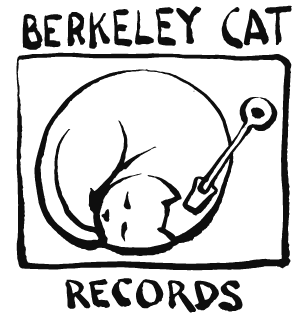Clifford Hayes’ Louisville Stompers – “Dance Hall Shuffle”
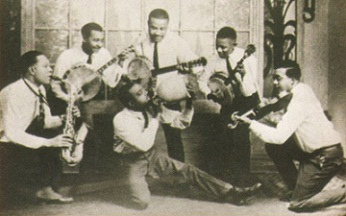 Another important figure in early Jug Music, Clifford Hayes was born in 1895 in Glasgow, Kentucky. Hayes played fiddle with the Earl McDonald Jug Band in nearby Louisville, the birthplace of Jug music. He later started his own band, and recorded with Sarah Martin and other notables. Jug music was a huge social and musical phenomenon in the late 19th and early 20th century, which happened to coincide with the dawn of recorded music. We are fortunate to have these clear audio glimpses into the past, and “Dance Hall Shuffle” more than lives up to its name. Such a great ensemble performance of piano, guitar, banjo, washboard, fiddle and the kitchen sink.
Another important figure in early Jug Music, Clifford Hayes was born in 1895 in Glasgow, Kentucky. Hayes played fiddle with the Earl McDonald Jug Band in nearby Louisville, the birthplace of Jug music. He later started his own band, and recorded with Sarah Martin and other notables. Jug music was a huge social and musical phenomenon in the late 19th and early 20th century, which happened to coincide with the dawn of recorded music. We are fortunate to have these clear audio glimpses into the past, and “Dance Hall Shuffle” more than lives up to its name. Such a great ensemble performance of piano, guitar, banjo, washboard, fiddle and the kitchen sink.
King David’s Jug Band – “Sweet Potato Blues”
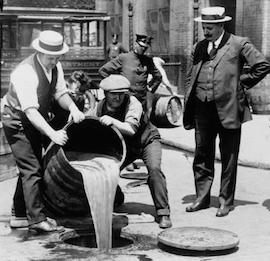 King David’s Jug Band was a popular attraction in Cincinnati, Ohio’s West End in the early 20’th century. Named for guitarist David Crockett, the group also featured Sam “Stovepipe” Jones on, well, just about everything. As a “one-man band” performing in speakeasies during prohibition and on the street, Jones played guitar, harmonica and kazoo (through a stovepipe!) all at once, while sporting a stovepipe hat (of course!). As King David’s Jug Band, they recorded six sides for Okeh Records. “Sweet Potato Blues,” provides a glimpse of this eccentric and very talented act.
King David’s Jug Band was a popular attraction in Cincinnati, Ohio’s West End in the early 20’th century. Named for guitarist David Crockett, the group also featured Sam “Stovepipe” Jones on, well, just about everything. As a “one-man band” performing in speakeasies during prohibition and on the street, Jones played guitar, harmonica and kazoo (through a stovepipe!) all at once, while sporting a stovepipe hat (of course!). As King David’s Jug Band, they recorded six sides for Okeh Records. “Sweet Potato Blues,” provides a glimpse of this eccentric and very talented act.
Harvey Brooks Quality Four – “Frankie And Johnny”
 Named after the Quality Cafe in Los Angeles, Harvey Brooks Quality Four was one of several bands formed by pianist Harvey Brooks with clarinet and sax man, Paul Howard. Here is their instrumental version of the classic American murder ballad, “Frankie and Johnny.” This song has been recorded and released both vocally and instrumentally a whopping 256 times at least, by a who’s-who of music greats from America and around the world. This was one of the first.
Named after the Quality Cafe in Los Angeles, Harvey Brooks Quality Four was one of several bands formed by pianist Harvey Brooks with clarinet and sax man, Paul Howard. Here is their instrumental version of the classic American murder ballad, “Frankie and Johnny.” This song has been recorded and released both vocally and instrumentally a whopping 256 times at least, by a who’s-who of music greats from America and around the world. This was one of the first.
Blind Blake – “Hookworm Blues”
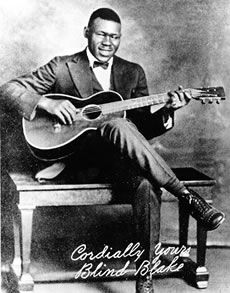 The “King Of Ragtime Guitar,” Blind Blake makes his 6-string sing on this swinging uptempo blues rag, “Hookworm Blues,” which also features the piano stylings of Alex Robinson. Blake’s vocal interlaces with the piano and guitar patterns to complete a whole much greater than the sum of its parts. This track really boogies, and it’s another fine example of an early blueprint for rock and roll. Famous for his innovative guitar work, Blind Blake recorded about 80 sides for Paramount Records.
The “King Of Ragtime Guitar,” Blind Blake makes his 6-string sing on this swinging uptempo blues rag, “Hookworm Blues,” which also features the piano stylings of Alex Robinson. Blake’s vocal interlaces with the piano and guitar patterns to complete a whole much greater than the sum of its parts. This track really boogies, and it’s another fine example of an early blueprint for rock and roll. Famous for his innovative guitar work, Blind Blake recorded about 80 sides for Paramount Records.
Dixieland Jug Blowers – “Boodle-Am Shake”
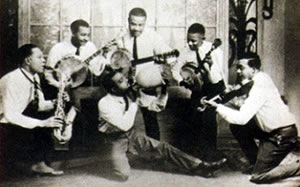 The Dixieland Jug Blowers fused the traditional Jug Band lineup of jug, banjo, guitar and fiddle, with jazz woodwinds, brass and piano. In fact the band was a combo of two separate groups run by jug player Earl McDonald and fiddler Clifford Hayes. Their musical innovations, immortalized on Victor Records, influenced other groups including the Memphis Jug Band. The “oompa oompa” tuba and carefree melodic interplay on “Boodle-Am Shake” set up a cartoonish vocal refrain perfectly, on this classic and joyous recording.
The Dixieland Jug Blowers fused the traditional Jug Band lineup of jug, banjo, guitar and fiddle, with jazz woodwinds, brass and piano. In fact the band was a combo of two separate groups run by jug player Earl McDonald and fiddler Clifford Hayes. Their musical innovations, immortalized on Victor Records, influenced other groups including the Memphis Jug Band. The “oompa oompa” tuba and carefree melodic interplay on “Boodle-Am Shake” set up a cartoonish vocal refrain perfectly, on this classic and joyous recording.
Peg Leg Howell – “Peg Leg Stomp”
 Born on a farm in Eatonton, Georgia in March of 1888, Joshua Barnes Howell taught himself to play guitar at the age of 21. He took the name “Peg Leg” after losing his right leg when he was shot in a fight. Howell then moved to Atlanta to pursue music full-time and in 1926 he was discovered and recorded by Columbia Records. On “Peg Leg Stomp” as on a series of releases through the 1920’s, Howell was accompanied by Eddie Anthony on fiddle and Henry Williams on guitar. Decades later, during the 1960’s blues revival, Peg Leg Howell was rediscovered by George Mitchell, who recorded him again.
Born on a farm in Eatonton, Georgia in March of 1888, Joshua Barnes Howell taught himself to play guitar at the age of 21. He took the name “Peg Leg” after losing his right leg when he was shot in a fight. Howell then moved to Atlanta to pursue music full-time and in 1926 he was discovered and recorded by Columbia Records. On “Peg Leg Stomp” as on a series of releases through the 1920’s, Howell was accompanied by Eddie Anthony on fiddle and Henry Williams on guitar. Decades later, during the 1960’s blues revival, Peg Leg Howell was rediscovered by George Mitchell, who recorded him again.
Big Bill Broonzy – “How You Want It Done”
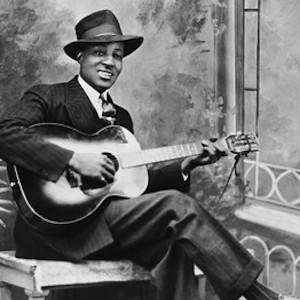 In his long career, Big Bill Broonzy wrote and copyrighted over 300 songs. Many were original, some were adaptations of folk songs in the oral tradition. You can hear in this early Broonzy recording of “How You Want It Done,” the seeds of rock and roll guitar playing which would later sprout in the hands of Chuck Berry, Bill Haley and many others in the 1950’s. We’re fortunate to have a nice clean digital copy to enjoy today.
In his long career, Big Bill Broonzy wrote and copyrighted over 300 songs. Many were original, some were adaptations of folk songs in the oral tradition. You can hear in this early Broonzy recording of “How You Want It Done,” the seeds of rock and roll guitar playing which would later sprout in the hands of Chuck Berry, Bill Haley and many others in the 1950’s. We’re fortunate to have a nice clean digital copy to enjoy today.
Paddy Killoran – “Sligo Maid’s Lament”
 Sligo is a form of lively folk music which takes its name from the county and town of Sligo on the west coast of Ireland. Paddy Killoran, one of the biggest names in Sligo, was born there in 1904. He emigrated to the United States in the 1920’s and embarked upon a prolific recording and performing career. “Sligo Maid’s Lament” was one of his popular 78 RPM sides. Sligo music is alive and well today, and if you like it as much as we do, have a look at sligomusic.ie for more info on the history of Sligo, and about contemporary and early Sligo artists.
Sligo is a form of lively folk music which takes its name from the county and town of Sligo on the west coast of Ireland. Paddy Killoran, one of the biggest names in Sligo, was born there in 1904. He emigrated to the United States in the 1920’s and embarked upon a prolific recording and performing career. “Sligo Maid’s Lament” was one of his popular 78 RPM sides. Sligo music is alive and well today, and if you like it as much as we do, have a look at sligomusic.ie for more info on the history of Sligo, and about contemporary and early Sligo artists.
Akins Birmingham Boys – “I Walked And Walked”
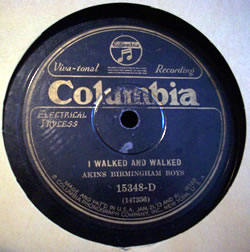 This is one fine early example of amply motivated walking in song, from a group called Akins Birmingham Boys. Little biographical info is available online about these ukelele strummin’ and fiddlin’ singers, but we do know they recorded this and one other side for Columbia records, and the songs more than stand the test of time. Great vocals on this early pop country gem.
This is one fine early example of amply motivated walking in song, from a group called Akins Birmingham Boys. Little biographical info is available online about these ukelele strummin’ and fiddlin’ singers, but we do know they recorded this and one other side for Columbia records, and the songs more than stand the test of time. Great vocals on this early pop country gem.
The Mississippi Sheiks – “Please Baby”
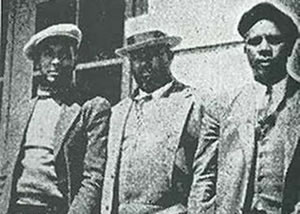 The Mississippi Sheiks from Bolton, Mississippi were a popular band in their time, and their recorded songs have been covered by an impressive list of artists that includes Howlin’ Wolf, Nat King Cole, Frank Sinatra, Harry Belafonte and Bob Dylan. Three of the Sheiks were brothers Lonnie, Sam, and Armenter Chatmon, the latter of whom is famously known as Bo Carter, who enjoyed a successful solo career while he managed and was a part time member of the band. This recording of “Please Baby” captures their distinct blend of country, folk, and blues.
The Mississippi Sheiks from Bolton, Mississippi were a popular band in their time, and their recorded songs have been covered by an impressive list of artists that includes Howlin’ Wolf, Nat King Cole, Frank Sinatra, Harry Belafonte and Bob Dylan. Three of the Sheiks were brothers Lonnie, Sam, and Armenter Chatmon, the latter of whom is famously known as Bo Carter, who enjoyed a successful solo career while he managed and was a part time member of the band. This recording of “Please Baby” captures their distinct blend of country, folk, and blues.

